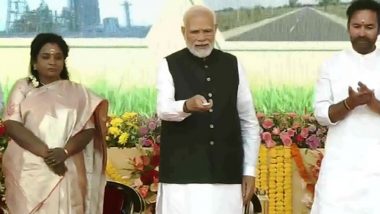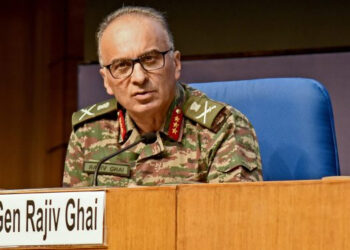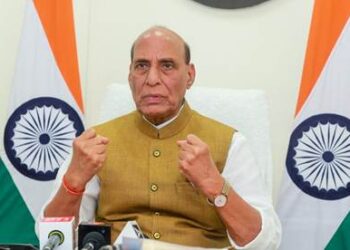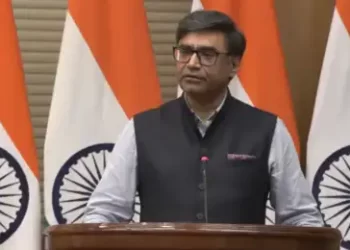The Prime Minister, Shri Narendra Modi laid the foundation stone and dedicated to the nation multiple projects worth over Rs 9500 crores in Ramagundam, Telangana today. Earlier today, the Prime Minister paid a visit to the Ramagundam Fertilizers and Chemicals Limited (RFCL) plant
Addressing the gathering, the Prime Minister said projects launched and for which foundation stones were laid today will promote both agriculture and agricultural growth. The Prime Minister pointed out that on one hand, the entire world is dealing with the corona pandemic and is getting affected by strenuous situations of war and military actions. “But among all of this”, the Prime Minister said, “experts are predicting that India is moving in the direction of becoming the third largest economy.” Experts, the Prime Minister said, are also saying that growth equivalent to 30 years from the 90s will take place in the coming few years. “The chief reason for this perception is the change that has taken place in the country during the last 8 years. India has changed its approach to doing work in the last 8 years. In these 8 years thinking as well as the approach of governance has undergone a transformation”, he said. This can be seen in infrastructure, government processes, ease of doing business, and transformations which are being inspired by the aspirational society of India, he added.
“A new India presents itself to the world with self-confidence and aspirations of development ”, he said. The Prime Minister said that development is a continuous mission that runs in the country 365 days a year. He further added that when a dedication of a project is carried out, work on new projects begins simultaneously. The Prime Minister also emphasized that efforts are made to pace up the development of projects whose foundation stones are laid and the Ramagundam project is a clear example of this. The foundation stone for Ramagundam Project was laid by the Prime Minister on 7th August 2016.
The Prime Minister pointed out that the India of the 21st century can move forward by realizing ambitious targets. “When the aim is ambitious, we have to come up with new methodologies and create new facilities”, the Prime Minister remarked. Shri Modi said that the fertilizer sector is proof of the honest efforts of the central government. Recalling the time when India used to depend on foreign countries to meet the demands of fertilizers, the Prime Minister pointed out that many fertilizer plants that were set up earlier were forced to shut down due to obsolete technologies, including Ramagundam Plant. He further added that urea which was imported at exorbitant rates was black-marketed for other purposes instead of reaching the farmers.
| Measures for improving fertilizer availability
|
After 2014, one of the first steps taken by the central government was ensuring 100% Neem Coating of Urea and stopping black-marketing. He further added that the soil health card campaign ensured the knowledge among farmers about the optimum needs of their fields. Five big fertilizer plants that were lying closed for years are being restarted. The Gorakhpur plant in Uttar Pradesh has started production, and the Ramagundam plant has been dedicated to the nation. When these five plants are fully functional, the country will get 60 lakh tonnes of urea which will lead to huge savings on imports and ease of availability of urea. Ramagundam Fertilizer plant will serve farmers in Telangana, Andhra Pradesh, Karnataka, Chhattisgarh and Maharashtra, he informed. The Plant will spur the economy of the surrounding areas and will give a push to logistics-related businesses in the area. “6000 crore rupees invested by the central government will give several thousand rupees benefit to the youth of Telangana”, he said. The Prime Minister also talked about the technological strides in the fertilizer field and said Nano Urea will bring a massive change in the field. The Prime Minister stressed the importance aatmnirbharta and mentioned how the global price rise of fertilizer due to the pandemic and war was not transferred to the farmers. A 2000 rs bag of Urea is made available for 270 rupees to the farmer. Similarly, a bag of DAP priced at Rs 4000 in the international market is subsidized to the tune of 2500 rs per bag.
“In the last 8 years”, the Prime Minister informed, “the central government has already spent approximately Rs 10 lakh crores so that farmers are not burdened for fertilizers.” He further added that the central government has spent 2.5 lakh crores so far this year to make cheap fertilizers available for the farmers of India. The Prime Minister informed that the central government has transferred approximately 2.25 lakh crores in the bank accounts of farmers under the PM Kisan Samman Nidhi. The Prime Minister also threw light on the multitude of brands of fertilizers that were available in the market which had become a cause for concern for the farmers for decades. “Urea will now have only one brand in India and it is called Bharat brand. Its quality and price are already determined”, he remarked. This is a clear example of how the government is reforming the sector, especially for small farmers.
The Prime Minister also touched upon the challenge of the connectivity infrastructure. The government is working to meet this challenge by providing every state with modern highways, airports, waterways, railways and internet highways. This is getting new energy from PM Gatishakti National Master plan. The coordination and informed working style is eliminating the possibility of projects hanging for a long time, he said. He said that the railway line connecting Bhadradri Kothagudem district and Khammam was prepared in 4 years and will greatly benefit the local population. Similarly, the three highways on which work started today, will benefit the industrial belt, sugarcane and turmeric growers.
Throwing light on the rumour mill that arises when the development works in the country picks up pace, the Prime Minister said that some forces create obstacles for political gains. He pointed out that similar rumours are currently being spread in Telangana regarding ‘Singareni Collieries Company Limited-SCCL’ and various coal mines. “The Government of Telangana holds 51% stake in SCCL, while the Central Government holds 49%. The Central Government cannot take any decision related to the privatization of SCCL at its own level”, the Prime Minister clarified and reiterated that no proposal for privatization of SCCL is under consideration with the central government.
The Prime Minister recalled the numerous scams of thousands of crores of rupees that have plagued the country regarding coal mines. He informed that the country as well as the workers, the poor and the areas where these mines were located suffered heavy losses. He further added that coal mines are being auctioned with complete transparency keeping in view the increasing need for coal in the country. “Our government has also created DMF i.e. District Mineral Fund to give benefits to the people living in the area where the minerals are extracted. Thousands of crores of rupees have been released to the states under this fund”, he added.
Concluding the address, the Prime Minister said “We want to take Telangana forward by following the mantra of ‘Sabka Saath, Sabka Vikas, Sabka Vishwas and Sabka Prayas’.
Governor of Telangana, Dr Tamilisai Soundararajan, Union Minister G Kishan Reddy, Members of Parliament and Members of Legislative Assembly were those present on occasion. Farmers from 70 Constituency seats were connected with the event.
Background
The Prime Minister dedicated Fertilizer plant at Ramagundam to the nation whose foundation stone for Ramagundam Project was also laid by the Prime Minister on 7th August 2016. The driving force behind the revival of the Fertilizer Plant is the vision of the Prime Minister to achieve self-sufficiency in production of urea. The Ramagundam Plant will make available 12.7 LMT per annum of indigenous neem-coated Urea production.
The project has been set up under the aegis of Ramagundam Fertilizers and Chemicals Limited (RFCL) which is a Joint Venture Company of National Fertilizers Limited (NFL), Engineers India Ltd (EIL) and Fertilizer Corporation of India Limited (FCIL). RFCL was entrusted with the responsibility of setting up the New Ammonia-Urea Plant with an investment of more than Rs 6300 crores. Gas to RFCL Plant will be supplied through Jagdishpur – Phulpur- Haldia Pipeline.
The plant would ensure adequate and timely supply of urea fertilizer to the farmers in the state of Telangana as well as in Andhra Pradesh, Karnataka, Chattisgarh and Maharashtra. The plant would not only improve the availability of fertilizer but will also boost overall economic development in the region including the development of infrastructures like roads, railways, ancillary industry etc. Apart from this, the region will benefit from the development of MSME vendors for supply of various goods for the factory. RFCL’s ‘Bharat Urea’ will provide a tremendous boost to the economy by not only reducing imports but also by giving an impetus to the local farmers through a timely supply of fertilizers and extension services.
The Prime Minister also dedicated the Bhadrachalam Road- Sattupalli rail line to the nation, which has been built at a cost of around Rs 1000 crores. He also laid the foundation stone of various road projects worth over Rs 2200 crores, namely the Medak-Siddipet-Elkathurthy section of NH-765DG; Bodhan-Basar-Bhainsa section of NH-161BB; Sironcha to Mahadevpur Section of NH-353C.
Happy to be in Ramagundam. Addressing a programme at launch of various development works. https://t.co/f86T8uVT1Z
— Narendra Modi (@narendramodi) November 12, 2022
Experts around the world are upbeat about the growth trajectory of Indian economy. pic.twitter.com/Q3nZbR4L4C
— PMO India (@PMOIndia) November 12, 2022







 Finance
Finance







